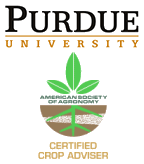
Proceedings 2007
Indiana Certified Crop Adviser Conference
Cover it up!
Cover crops were commonly used before commercial fertilizers were developed. Due to high fuel and nutrient input costs, there has been a renewed interest for cover crops. Cover crops serve many beneficial purposes such as nitrogen production, erosion control, improving soil quality, weed, insect, disease and nematode management. The cover crop program at the Michigan State University W.K. Kellogg Biological Station in Hickory Corners has been working with farmers to find ways to fit cover crops into current farming systems.
Biosuppressant cover crops can be seeded with manure and have dramatically reduced weed populations. These same biosuppressant cover crops have shown activity on plant diseases such as pithium in the alb. Legume red clover have provided up to 100 pounds of nitrogen when frost seeded into wheat. Rye has been shown to reduce nitrogen loss in tile drainage up to 50% in corn-soybean rotations.
Rye is also being used for mulch in a weed control system for organic no-till soybeans.
Cover crops can be an important part of a farmers overall management strategy. The incorporation of cover crops will help reduce costly inputs on the farm.
Dale R. Mutch Extension Specialist and NCR-SARE PDP State Coordinator
Michigan State University/W. K. Kellogg Biological Station
mutch@msu.edu
Mutch has more than 27 years of research and Extension experience in organic farming, IPM, cover crops and sustainable agriculture. He has served on the NCR SARE Administrative Council, Technical Committee and Producer Grants Program. His career emphasis has been on low-input and organic farming systems. His applied research focuses on participatory projects that use farmer advisory teams to direct and validate the work. Mutch manages eight OCIA-certified organic research acres. Recent Extension publications include Building a Sustainable Future: Ecologically Based Farming Systems E-2983, Integrated weed management: One year=s seedingY(E-2931), No-till drilling cover crops after wheat harvest and their influence on next season=s corn (E-2897), Cover crop choices for Michigan vegetables (E-2896), Cover crop choices for Michigan (E-2884), Oilseed radish, a new cover crop for Michigan (E-2907), Michigan Field Crop Pest Ecology and Management (E-2704) Michigan Field Crop Ecology (E-2646) and . In 2004 he initiated the New Agriculture Network, a web-based biological farming information outlet for organic farmers. Three states and 15 farmers connect for conference calls throughout the growing season to share information and learn about research needs and to use each other as sounding boards for new ideas and future projects. Farmers and university specialists write articles which are published on The New Agriculture Network website (www.new-ag.msu.edu). Research/education projects can be viewed on the KBS Cover Crop website (www.covercrops.msu.edu).